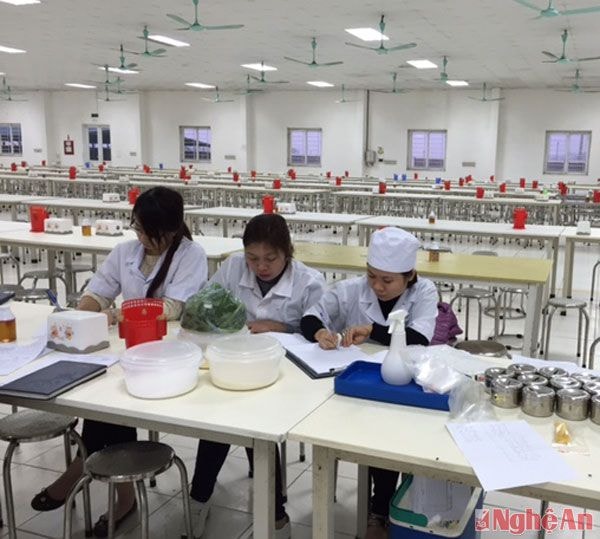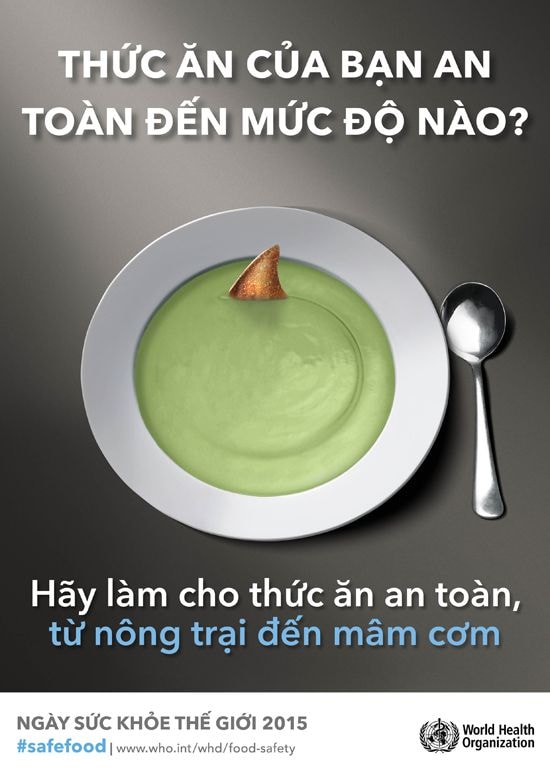92% of food poisoning is caused by microbial overdose.
(Baonghean.vn)-In Vietnam, the number of food poisoning cases every year is still very large and according to health sector statistics, 92% of food poisoning cases are caused by excessive doses of microorganisms contained in food.
Food poisoning – a national challenge
The theme of World Health Day on April 7, 2015 was chosen by the World Health Organization (WHO) as “From Farm to Table”. According to this organization: Unsafe food causes more than 200 types of diseases and each year takes the lives of about 2 million people in the world… unsafe food hinders the socio-economic development of each country.
In Vietnam, in recent years, there have been significant advances in ensuring food safety. In 2010, the National Assembly passed the Food Safety Law; in 2011, the Government approved the National Food Safety Strategy for the period 2011 - 2020 with a vision to 2030; in 2014, Vietnam also participated in regional simulation exercises to test national emergency responses and notification procedures for domestic food safety events.
 |
| Nghe An Food Safety and Hygiene Department collected food samples from the kitchen after the poisoning of 300 workers at Namsung Vina Garment Factory in Dien Hong Industrial Park, Dien Chau District. Photo: NK |
Also in 2014, information from the Food Safety Department, Ministry of Health: There were 194 reported cases of food poisoning nationwide, with more than 5,000 people poisoned, 80% of whom had to be hospitalized, 43 cases died... Compared to 2013, the number of people affected or hospitalized by food poisoning has decreased, however these numbers are just the "tip of the iceberg".
Ensuring food safety and hygiene is currently a challenge, because Vietnam is at a fast pace of economic development; consumers lack awareness and do not have the conditions to assess dirty food. Responding to World Health Day, aiming to eliminate dirty food, our State commits to improving the food safety situation in Vietnam, requiring all consumers and producers to comply with food safety to protect lives and improve people's health.
To ensure food safety, WHO supports Vietnam in improving disease surveillance, field epidemiology, risk assessment, risk communication, and infection prevention and control activities in accordance with the International Health Regulations.
Nghe An is heavily concerned about dirty food.
In 2014 alone, Nghe An province had 7 major food poisoning cases with hundreds of people infected, 4 people died. According to information from the health sector, 92% of food poisoning cases were caused by excessive doses of microorganisms contained in food. These were green vegetables and ripe fruits that had been sprayed with growth stimulants and pesticides right before being put on the market for consumption; chemicals for raising livestock, preserving meat, fish, and fruits were not allowed to be used.
The concern about food is even greater when knowing that: From October 2014 to early February 2015, the Market Management Department inspected 89 cases, handled 66 violations with a total fine of 308 million VND, destroyed 195 kg of animal organs, 34,000 poultry eggs, 50 kg of food additives; bringing the total number of violations to 260 cases, the amount of fines collected to 1,125 billion VND since the beginning of 2014...
According to information from the Environmental Police Department, Nghe An Police: In 2014, the Department fought to prevent and handle many crimes and violations of food safety laws. Accordingly, the Department discovered 70 cases of food safety violations with fines of 310 million VND, destroyed 252 kg of livestock meat, nearly 55.5 tons of poultry meat and dozens of tons of ham hocks and other organs.
Market inspection and food production and trading establishments are currently only a “necessary” solution, not a “sufficient” one. It only addresses the surface of the problem and cannot be thorough. The long-term, sustainable solution must still be to encourage the development and replication of closed clean food models from production to consumption.
 |
| World Health Day 2015 theme is “From Farm to Fork” |
A
Food safety - not just one person's responsibility
Food producers, processors and traders are responsible for the safety of the food they produce and trade; and consumers must take precautions and adhere to good food safety practices. It is still necessary that all localities and functional sectors in the province actively participate.
In a recent food safety inspection, Ms. Dinh Thi Le Thanh, Vice Chairman of the Provincial People's Committee, Head of the Interdisciplinary Steering Committee on Food Safety and Hygiene of Nghe An province, emphasized: "Authorities need to strictly handle and publicize violations on mass media so that people can avoid and boycott them; Authorities at all levels and market management boards need to be more active in propagating so that people have knowledge to prevent poisoning and choose clean food that ensures quality."
To ensure food hygiene and safety, the role of smart consumers in choosing clean food and boycotting "dirty" food is very important. Doctor Dao Trong Dung, Head of the Department of Food Safety and Hygiene of Nghe An province, said: For the health of the community, producers and traders need to uphold "conscience and responsibility", each citizen needs to uphold civic responsibility to speak up to denounce violations, helping people stay away from foods that do not ensure quality.
Dr. Dung further recommends: To have safe and healthy food, people can protect themselves and their families by learning about food safety and hygiene, following the 10 golden rules for food preparation, and the 5 keys to safer food (keep clean - wash your hands and keep food preparation surfaces clean; separate cooked and raw foods; cook food thoroughly, especially meat, poultry, and eggs; keep food at the right temperature; use clean water and safe fresh food when preparing food).
Thanh Son
| RELATED NEWS |
|---|






